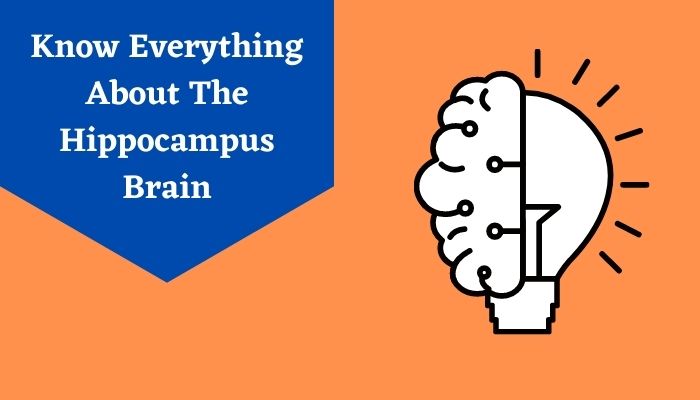The brain is the most important organ in the human body that is responsible for every important function and cognitive processing. Most parts of the body can be transplanted to revive damaged organs, however, the critical thinking machine is irreplaceable and more susceptible to injury as compared to other important structures.
One of the most vital of all the parts of the brain is the Hippocampus. It plays important role in daily life that is crucial to everyone, regardless of their mental and physiological influences. So let us take a look at what the hippocampus brain is and what happens when there is damage to the hippocampus.
What Is A Hippocampus Brain?
The hippocampus brain is the area that is responsible for memory, recalling instances, storing new information, and segregating the important from the unimportant. The importance of the hippocampus on the brain is the ability to isolate and process significant information, reroute the neural pathways to create a memory bank, and store relevant information with the correct nuances.In simple words, the hippocampus brain is responsible for acquiring new information, forming coherent structures with the data, organizing it with other relevant information, and storing it all with segregated significance.
In short, the hippocampus brain is the one responsible for creating and remembering new memories. Thus, it is a crucial part of the brain and requires considerable upkeep.
Given the importance of the hippocampus on brain, you must know the results of hippocampus damage and the subsequent consequences they may follow. But first, let us take a look at the functions of the hippocampus on brain.
What Are The Functions Of The Hippocampus On The Brain?
As you know, the hippocampus brain is responsible for acquiring, organizing, and stabilizing new memory patterns. While that is its primary function in a gist, research shows that there are sub-regions in the hippocampus brain that affect the dispersion and recollection of certain information in categorized memory.Here’s how the different types of memory modules are managed by the hippocampus brain:
Spatial Memory
Spatial memory is the sort of information that helps us calculate the puzzling data that we receive and fit them in patterns. For instance, determining the pathways through a maze of streets, befitting certain objects with others based on characteristics, or reasoning through the factors that affect some memories.Spatial memory is stored, analyzed, and used in the rear parts of the hippocampus brain. It develops and grows to facilitate quick contemplations and movements from muscle memory that use information stored through time.
Memory Consolidation
Another crucial part of the hippocampus of the brain is the consolidation of memory segments. You may not always notice but often when you sleep, you recall certain incidents or lessons that you recently learned. This is the hippocampus brain trying to merge the information with relevant sub-modules and storing it in the appropriate segments where it can recall and make connections in memory.The power of the hippocampus on the brain is very strong, especially during the sleep cycle when irrelevant memories lay a very small role. Thus, while you sleep, and seldom dream about what you learned, the hippocampus brain works towards categorizing and embedding the information in your mind. That is why when you merge memories in your sleep, you are more likely to remember certain incidents or data.
Memory Transfer
The hippocampus brain is not the place to permanently store memories but more of a temporary silo. This part of the brain takes in the data, categorizes it, and forms relevant connections.After building the neural pathways to certain memories during sleep, the hippocampus brain transfers the information to other storage facilities in the brain as per the relevance of the data.
As you can see, the impact of the hippocampus on the brain is quite significant. Therefore, any damage to the hippocampus can have serious repercussions on a person’s life. It is very important to be mindful of certain pitfalls that could result in hippocampus damage.
What Is The Impact Of Damage To The Hippocampus?
The hippocampus brain is responsible for spatial memory, recalling directions, dorsal orientations, and even locations. Therefore, damage to the hippocampus could cripple the memory sensors in the brain.Hippocampus damage can often lead to the inability to recall important instances, data, and even significant memory patterns. Furthermore, it prevents or at the very least, limits a person’s potential to formulate new memory pathways, i.e., making it highly impossible to form new memories.
Thus, if there is damage to the hippocampus brain, the likelihood of the person forgetting important information in the long term and their inability to create short-term neural pathways to important memories are significantly high. Any hippocampus damage can cripple the brain’s ability to process new information to reconnect with long-term patterns.
Tips For Hippocampus Brain
As you can see, the hippocampus brain is more than just an important part of the nervous system, it is a primordial necessity, and one that you should avoid damaging at all costs. Even though being cautious is great advice, hippocampus damage can initiate automatically with age, stress, and trauma.To begin with, exercising is an excellent method to strengthen the hippocampus brain internally and naturally. It also helps relieve stress, which inadvertently lowers the risk of hippocampus damage in the long run.
Additionally, you can also consult physicians for advanced treatment methods that inspire stronger resilience with anti-anxiety medication and even anti-depressants to an extent. Prevention of Post Traumatic Stress Disorder is also a viable means to avoiding persistent damage to the hippocampus.
Conclusion
The hippocampus brain is not just one of the most important but a critical part of the brain required for survival. It is primordial in daily activities, navigation, communication, and all the crucial functionalities. Thus, it is pivotal to protect the hippocampus brain with exercise and actively prevent trauma that could lead to damage to the hippocampus.If you have problems with memory, it is best to consult a neurologist and have the hippocampus brain checked out at the earliest.


